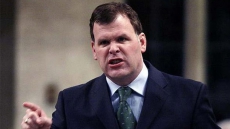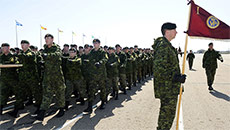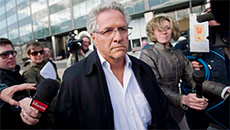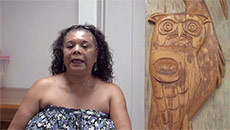VANCOUVER - Refurbishments are underway on a First World War cenotaph in Vancouver's Stanley Park honouring Japanese-Canadian soldiers — a memorial that stands as both a testament to their patriotism and a reminder of Canada's prejudiced past.
Many of those remembered by the monument were denied the right to enlist in British Columbia at the start of the war and had to travel to Alberta, where they joined up with regiments like the Calgary Highlanders.
Dozens died while fighting in Europe, and shortly after the war ended, the limestone cenotaph was erected, etched with the names of the men who fought.
Prof. Tim Cook, a historian at the Canadian War Museum and an adjunct research professor at Carleton University, said Canadians of African and Asian ancestry, as well as First Nations, all faced discrimination.
"Canada was not the multicultural country that it is today," he said. "It was very much a prejudiced society."
After Britain declared war on Aug. 4, 1914, most of the first recruits were Anglo-Saxon and English speaking, and those who weren't were simply turned away, said Cook.
First Nations were treated a bit differently, he added, because they had a reputation for being snipers and scouts. Still, the government didn't know what to do with aboriginal volunteers because it feared the Germans wouldn't extend any mercy on the battlefield to those they captured. By the end of the war, about 4,000 First Nations served, said Cook.
About 60 per cent of Canada's first contingent of soldiers were British born, 30 per cent were Canadian and about 10 per cent were others, Cook said, adding that most of the recruits were former British soldiers who served in the Boer War or were members of the Canadian militia or professional army.
David Mitsui, of Edmonton, said his grandfather, Masumi Mitsui, was turned away in B.C.
"They wanted to show their patriotism for Canada," he said. "That was their newly adopted country and they wanted to show that they deserved to be treated like other Canadians."
Mitsui said his grandfather, who was born in Japan in 1887, didn't give up, and travelled with others from B.C. to Alberta, where they enlisted with the Calgary Highlanders in 1916. The men later formed an almost entirely Japanese-Canadian unit known as the 10th Battalion.
While the memorial in Stanley Park puts the number of Japanese-Canadian volunteers at about 190, Mitsui said subsequent research has increased those figures to 225, 54 of whom died in the war.
Mitsui said his grandfather was awarded the Military Medal for bravery and returned to Canada after the war. He then lobbied for the right to vote, which as a veteran he won in 1931, although those of Japanese ancestry were still barred from voting until the late 1940s.
Mitsui said he didn't learn much about his grandfather's military experience until the 1980s.
"He never talked about it," he said, adding that he's proud of his grandfather's contribution.
Russell Grosse, executive director of the Black Cultural Centre for Nova Scotia, said Canadians of African ancestry also faced discrimination at recruiting stations.
While there was no written policy, Grosse said racism was something that was just commonplace.
Regardless, members of the black community formed the No. 2 Construction Battalion on July 5, 1916, said Grosse, and while its members weren't allowed to fight, they dug trenches and repaired roads.
Grosse said the all-volunteer unit attracted hundreds of men from Nova Scotia, Ontario, western Canada, and even the United States.
"This was a group of men that wanted to serve their country and for whatever reasons of the time — racism, difference of opinion, unwritten rules — they weren't able to do so until they were able to form this battalion," he said.

"So they weren't able to fight side by side with their fellow Canadians. They had to fight together and they had to do the undesirable jobs."
Eric Levine, secretary-treasurer of Toronto's Jewish Canadian Military Museum, said Jewish-Canadians didn't face the same sort of discrimination. His organization even owns a poster written in Yiddish that was directed at possible recruits living in Montreal, he said.
"This typifies the attitude of Jews in that period, an immigrant community that was totally committed to what was then a very Anglo-Saxon attitude in Canada," he said, adding pro-British opinion was even more pronounced in Toronto's Jewish community.
During the First World War, 38 per cent of all Jewish males older than 21 in Canada served in the Canadian Expeditionary Force, he noted.
Levine said even though Jewish people faced restrictions in Canadian society, especially in the academic world, those restrictions were nothing like the pogroms and forced military service they experienced in Eastern Europe.
Many enlisted because they wanted to prove they were committed to Canada and wanted to protect the freedoms of their new country, he said.
"That's what they came here for, the freedom that they didn't have in the old lands, and Canada gave them that."
Once in Europe, most non-Anglo-Saxon Canadian soldiers didn't experience the same type of racism they experienced at home, said Cook, who researched the issue while looking at soldiers' letters, journals and diaries.
"Black soldiers were accepted. Japanese soldiers seemed to have been accepted. They sang the same songs, they stood shoulder to shoulder, they dug the same trenches. They went over the top together," he said.
Cook said attitudes inside the armed forces during war are often very different than the attitudes on the home front.
Back in Vancouver, Linda Kawamoto Reid, chair of the Japanese Canadian War Memorial Committee, said her group will spend about $100,000 restoring the Stanley Park monument and its pagoda-like roof.
"It is the only one nationally that we're aware of," said Reid, noting she was recently told about a similar memorial in Kincolith, a small community in northwestern, B.C., that honours Japanese-Canadian veterans and fishermen.





